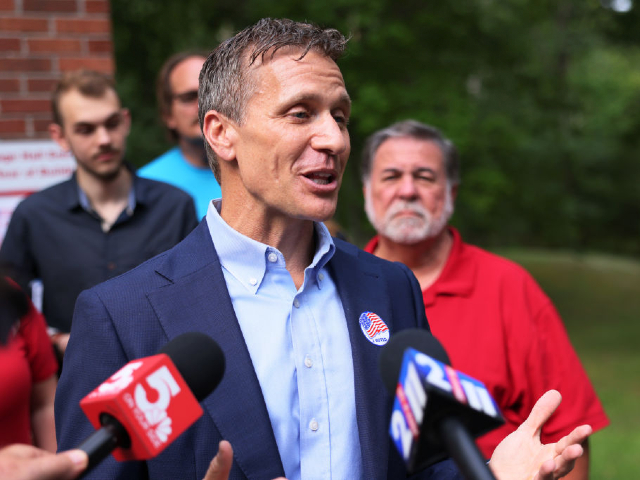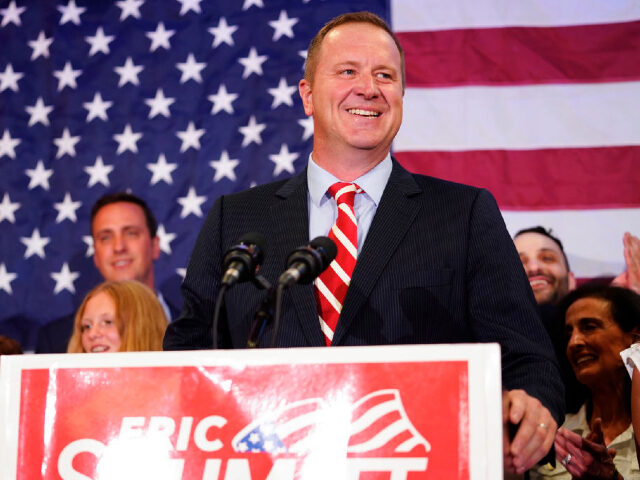Former President Donald Trump shocked the political world on Monday when he issued a generic nonspecific endorsement of “Eric” in Missouri’s U.S. senate primary, leaving it open-ended whether he meant Attorney General Eric Schmitt or former Gov. Eric Greitens.
While both sides fought vigorously for the endorsement and campaigned in the state just as aggressively, Trump’s decision to remain ambiguous at the 11th hour provided some much-needed levity and humor to an otherwise nasty primary campaign.
“There is a BIG Election in the Great State of Missouri, and we must send a MAGA Champion and True Warrior to the U.S. Senate, someone who will fight for Border Security, Election Integrity, our Military and Great Veterans, together with having a powerful toughness on Crime and the Border,” Trump said. “We need a person who will not back down to the Radical Left Lunatics who are destroying our Country. I trust the Great People of Missouri, on this one, to make up their own minds, much as they did when they gave me landslide victories in the 2016 and 2020 Elections, and I am therefore proud to announce that ERIC has my Complete and Total Endorsement!”
Put more plainly: Trump is funny. Humor helps people deal with tough situations. Trump played it perfectly by grabbing everyone’s attention, and then taking down the anger and emotion with a simple joke the night before the election.
Both Schmitt and Greitens were hoping they would get the endorsement outright after Trump had previously ruled out Rep. Vicky Hartzler (R-MO) in the primary weeks ago, and both teams worked Trump hard for it. Trump’s America First movement also split in the race, with several of Trump’s hardcore supporters backing one candidate over the other—and Trump’s decision to stay out of the race until the very end made it difficult for each side to accept that the other would pull it off.

INNSBROOK, MISSOURI – AUGUST 02: Former Missouri Gov. and Missouri Senate Candidate Eric Greitens speaks with reporters after voting during Primary Election day at the Village Hall on August 02, 2022 in Innsbrook, Missouri. Greitens was quick to claim the endorsement of Former President Donald Trump yesterday after he made a confusing endorsement of “ERIC” on Monday night without clarifying if it was the former Missouri Gov. Eric Greitens or State Attorney General Eric Schmitt. (Photo by Michael M. Santiago/Getty Images)
Polling was all over the place in this race, too. For most of the campaign, Greitens was leading the pack, but a bevy of polls in the final week suggested a Schmitt surge—which proved to be right. Oftentimes, late breaks in polling, especially from pollsters who have not regularly polled a state or who have interests in the outcome of the election, do not pan out in the actual election results. Missouri proved to be an exception to that rule this year, and most of those final polls showing Schmitt leading were indeed correct.
The campaign was nasty in general as well, with Greitens’ ex-wife making allegations against him that played out in court hearings and the media in addition to Schmitt facing attacks for being too close to the establishment and for being friends with various controversial Democrats. The entire race hinged on Greitens’ early decision to announce public opposition to Senate GOP leader Mitch McConnell. Greitens made that the centerpiece of his campaign, and Schmitt and Hartzler both later joined him in announcing their opposition in the final days of the race as well.
The divisive campaign, no matter who won, threatened to upend the likelihood of the winner holding the seat for Republicans in November—Democrats have been salivating at the possibility of flipping a Missouri seat as they believe that would seal them holding the U.S. Senate majority in November—so that’s where Trump’s 11th hour move comes in particularly handy.
Maybe Republicans writ large could learn a thing or two from Trump: Railroading conservative anti-establishment candidates with unfair attacks and tens of millions of dollars in attack ads is no way to win an election, as the establishment will likely lose that candidate’s supporters later in a general election. Fair and square is the way to actually win, and then carry that into the general election to win there. The establishment’s disdain for supporters of candidates like Eric Greitens is what cost Republicans general elections so many times over the past several years, from Mitt Romney’s loss in 2012 to Martha McSally’s losses in Arizona to so many more—the examples are endless. Trump’s handling of this election makes it far easier for many Greitens supporters to quickly move onto helping Schmitt later, and he did it with a simple statement that was just over 100 words long.
In the end, it was Schmitt who won the nomination—and for Trump’s purposes he can obviously claim victory because he can say this one was the “Eric” he meant all along. But more importantly Trump’s move can help unite the party against the Democrats, as he took the temperature down significantly inside the party and focused the energy of all sides where they need it to be: on the Democrats and November.
While the two candidates themselves have not yet made up—Greitens has not as of this publication formally endorsed Schmitt for the general—the two camps are already talking to each other, a much faster post-primary party reunification than has played out in several other contentious primaries nationwide. Most on both sides are openly laughing with Trump about the nonspecific “Eric” endorsement and advisers to both candidates told Breitbart News they loved it and found it hilarious.
The Greitens team, meanwhile, because of Trump’s action, cannot feel like they got a raw deal or got railroaded by the establishment—they indeed got a very fair shake and a fair shot in this election—and the Schmitt team is over-the-moon happy about its victory. That brings the temperature down and helps the two sides work it out so they can focus on Democrat Trudy Busch Valentine.
Beyond Missouri, the fault lines in this primary could have ripped the America First movement apart if Trump had not made the move he did. Several top figures from Trump’s White House, Trump’s family, and other top allies backed Greitens, and several others backed Schmitt. By playing both sides against the middle, Trump emerges yet again as the nominal leader of the movement—and the party—and holds everyone together for the general election this year and, more importantly, for a potential looming 2024 campaign. If he runs for president again, Trump is going to need everyone from all sides on his team—and in so doing, what he just did held the whole crew together.
Things could have been very different had Trump decided to endorse earlier in the race. Had Trump endorsed, say, a few weeks ago or a few months ago—like he did in most other races nationwide—he probably could have straight up picked either Schmitt or Greitens and easily guided whichever candidate he selected to the nomination. But when Trump picked a really controversial candidate in another state, Dr. Mehmet Oz in Pennsylvania, serious divisions inside the party emerged—and now Oz is in trouble in the general election. So Trump seems to have learned from that situation, and Missouri is shaping up to be much rosier of a red lock for November than Pennsylvania—and the movement Trump commands is so much better off because of it all.

COMMENTS
Please let us know if you're having issues with commenting.